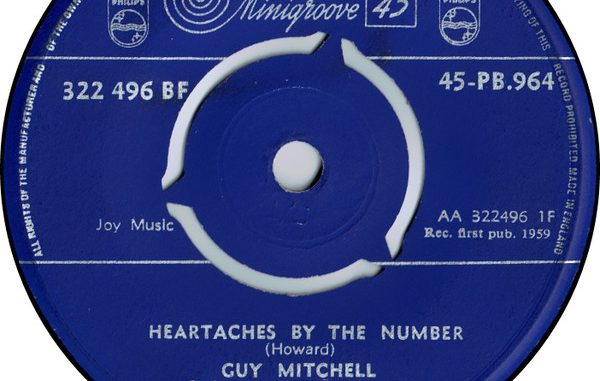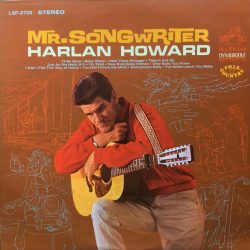
Harlan Howard pretty much wrote the book when it comes to country songwriting. Howard is the man behind the famous description of country music as being “three chords and the truth” and it’s a hard description to dispute. Certainly, Howard himself didn’t stray too far from that path when he wrote his songs. And it’s hard to argue that he didn’t know what he was talking about; he wrote ‘I Fall to Pieces’ (co-written with Hank Cochran) for Patsy Cline, ‘Busted’ for Ray Charles, ‘The Chokin’ Kind’ for Joe Simon and, his first big hit, ‘Heartaches by the Number’, originally recorded by Ray Price but a staple of country performers since it first appeared. His songs have been covered by everyone from Johnny Cash to Candi Staton and all stations in between and, while he’s always thought of as a country music writer, the reality is that he just wrote great songs, many of which transcended genre. In all, he wrote and co-wrote over 4,000 songs, with more than a hundred of those being top ten country music chart hits.
Howard was born in Detroit, Michigan in 1927. Considering his talents as a lyricist it’s hard to believe that he completed just nine years of formal schooling, but he was an avid reader who became captivated by the sound of country music when he would listen to the Grand Ole Opry radio show as a child. He wrote his first song at just twelve years of age, though it would be some time before the hits started to flow. Lacking educational qualifications, he served as a paratrooper in the military before, in 1955, deciding to move to L.A. to pursue his songwriting dreams. He apparently chose to go to L.A. because, while he was waiting for his break as a writer, there were always factory jobs to be found in and around the city. In fact, he did spend time as a factory worker – and a truck driver, a cab driver, and a petrol pump attendant. But it all provided material for his songs; each day he’d hear phrases and snippets of conversations that would fuel his imagination and he once said that he could return home from his regular job with up to six song ideas in a day, all to be worked on through his evenings. This obsessive attention to his craft eventually paid off and, a year after arriving in L.A. he had a chance introduction to the actor and singer, Tex Ritter, and to singer-songwriter Johnny Bond. The two had formed a music publishing company, Vidor Productions, largely to source material for Ritter, though both of them would have a series of hits throughout their careers. Both Ritter and Bond would record songs by Howard and, through that connection, he went on to have recordings of his songs made by some of the most prominent names of the time, including Wynn Stewart, Bobby Bare, and the great Buck Owens. His first big hit came from Charlie Walker, a Texan who had started out as a DJ before getting a recording deal with Decca records. Walker had managed only one hit single, ‘Only You, Only You’ that he co-wrote with Jack Newman and took to number 9 in the country charts in 1956, before Decca dropped him. He found a new deal with Columbia Records and decided to record a song written by the up-and-coming Harlan Howard, ‘Pick Me Up On Your Way Down’, in 1958. It would peak at number 2 and spend 22 weeks on the country charts. Howard had his first major hit song and one that has gone on to be a country classic. A year later he scored an even bigger hit with what is one of his best known and most successful songs, ‘Heartaches by the Number’. Country singer Ray Price would be the first to record it, giving it a 40 week run on the country charts where it peaked at number 2. Pop singer Guy Mitchell went one better; his version, recorded just a few weeks after Price’s, would top the Billboard 100 and score a top ten position (number 5) in the UK singles chart. Howard was on his way!
In 1960 Harlan Howard and his family, second wife Jan Howard and her sons, moved to Nashville and began a phenomenally prolific period of writing that, at one point, saw him with no less than fifteen of his compositions in the Country music Top 40 at the same time, a record that has never been equalled. It was during this period that he wrote such well-known songs as ‘Excuse Me (I Think I’ve Got a Heartache)’, ‘Above and Beyond’, both significant hits for Buck Owens (who would also record an album of Howard songs in 1961, “Buck Sings Howard”) and the superb ‘I Fall to Pieces’, which gave Patsy Cline a major cross-over hit and her first number one position in the country charts.

Throughout the 60s Howard just went from strength to strength and, as well as his solo writing, he would start to collaborate with major artists on co-writes, such as ‘I’ve Got A Tiger By The Tail’, written with Buck Owens and a number one hit for him, and working with Tompall Glazer to produce the superb ‘Streets of Baltimore’ for Bobby Bare. 1961 saw him record his first album in his own right, “Howard sings Howard” – in total he would release six of his own albums throughout his career, culminating in 1981’s “Singer and Songwriter”, but he never had as much success with his own songs as others had. That never bothered him because he had no interest in being successful as a performer. He was, first and foremost, a songwriter and that was always where his focus lay. As one collaborator observed, “Harlan Howard was 100% songwriter. All of the time.”
In 1964, he established his own publishing company, Wilderness Music, and in 1967 an up and coming Waylon Jennings would release a whole album of Howard songs, “Sings Ol’ Harlan”, as well as a single (not included on the album), his version of Howard’s ‘The Chokin’ Kind’, that would give him a major hit, going to number 8 on the charts. It was a phenomenal period of success that looked as if it would go on forever so, of course, it abruptly ground to a halt! As the 60s faded away so too, it seems, did Howard’s creative energy and he entered a period of writers’ block that threatened to undo all the success he had previously had. Thankfully, the decade did produce a couple of major hits, though they were poor efforts by Howard’s previously high standards; however, the mawkish sentimentality of ‘No Charge’, for Melba Montgomery, and the saccharine sweetness of Charlie Rich’s ‘She Called Me Baby’, were certainly commercially successful, if lacking the wit and edge of his earlier work.
The 70s proved a tough decade for Howard, though it did see him inducted into the Nashville Songwriters’ Hall of Fame in 1973. He’d have to wait a further 24 years before his genius as a songwriter would be further recognised by both the Country Music Hall of Fame and the Songwriters’ Hall of Fame, being inducted into both in 1997. From the 80s onwards Howard went into semi-retirement, recognising that his style of songwriting didn’t resonate so much with the audiences of the time. Instead, he would turn his attention to mentoring younger songwriters, regularly giving his time to tutoring up-and-coming writers. Late in the 80s, he underwent something of a renaissance, as a new generation of singers discovered his back catalogue and started to give some of his songs a new lease of life, with k.d. lang recording ‘I’m Down to My Last Cigarette’ on her “Shadowland” album, Highway 101 recording “Somewhere Tonight”, a song Howard had co-written with new kid on the block, Rodney Crowell, and The Judds would take their version of ‘Why Not Me’ back to the top of the country charts.
The “Irving Berlin of Country Music”, as he was often referred to by the media, died in March 2002, from a heart attack, at the age of 74. Rodney Crowell, one of Howard’s disciples, said of him that he “was a pre-Dylan. He threw acid into the mix. He was coming behind Hank Williams and all those sentiments were still fresh–‘I’ve got heartaches by the numbers and troubles by the score.’ It was poetry”. Kris Kristofferson, himself no slouch as a noted lyricist, said “The gift of a great Harlan song was they were direct, simple and from the heart. He’s up there with Hank Williams. He was one of the heroes.”
Anyone who has ever tried to write a song will know just how difficult it is. Harlan Howard was a great songwriter because he was passionate about what he did. He lived to write songs and the preparation and work that he put into them shows in the quality of their lyrics and the simplicity of their melodies. Three chords and the truth, every time.


